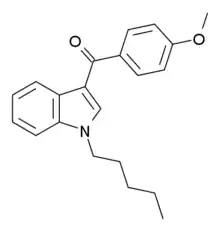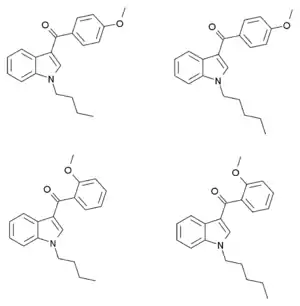RCS-4
RCS-4, or 1-pentyl-3-(4-methoxybenzoyl)indole, is a synthetic cannabinoid drug sold under the names SR-19, BTM-4, or Eric-4 (later shortened to E-4), but originally, OBT-199.
 | |
| Legal status | |
|---|---|
| Legal status |
|
| Identifiers | |
| |
| CAS Number | |
| ChemSpider | |
| UNII | |
| CompTox Dashboard (EPA) | |
| ECHA InfoCard | 100.233.383 |
| Chemical and physical data | |
| Formula | C21H23NO2 |
| Molar mass | 321.420 g·mol−1 |
| 3D model (JSmol) | |
| |
| |
| | |
Pharmacology
RCS-4 is a potent cannabinoid receptor agonist, with EC50 values of 146 nM for human CB1 receptors, and 46 nM for human CB2 receptors.[2] All methoxyphenyl regioisomers, and N-butyl homologues of RCS-4 and its regioisomers also display potent agonist activities at CB1 and CB2 receptors.[2]
Legality
RCS-4 was banned in Sweden on 1 October 2010 as a hazardous good harmful to health, after being identified as an ingredient in "herbal" synthetic cannabis products.[3][4]
It was outlawed in Denmark on 11 March 2011.[5]
In August 2011, New Zealand added not only RCS-4 but also its 1-butyl homologue, and the 2-methoxybenzoyl isomers of both these compounds, to a temporary class drug schedule (i.e. equivalent to Class C but reviewed after 12 months, and with personal possession and use of small amounts decriminalised), which was newly created under the Misuse of Drugs Amendment Act 2011 passed a week earlier.[6][7][8]
As of October 2015 RCS-4 is a controlled substance in China.[9]

See also
References
- "Ustawa z dnia 15 kwietnia 2011 r. o zmianie ustawy o przeciwdziałaniu narkomanii ( Dz.U. 2011 nr 105 poz. 614 )". Internetowy System Aktów Prawnych. Retrieved 12 June 2011.
- Banister SD, Stuart J, Conroy T, Longworth M, Manohar M, Beinat C, et al. (2015). "Structure–activity relationships of synthetic cannabinoid designer drug RCS-4 and its regioisomers and C4 homologues". Forensic Toxicology. 33 (2): 355–366. doi:10.1007/s11419-015-0282-9. S2CID 33994750.
- Swedish Code of Statutes Regulation (2010:1086).
- Swedish Code of Statutes Regulation (2010:1086). (pdf) Archived 2011-07-28 at the Wayback Machine
- "Bilag 1 - Liste over euforiserende midler omfattet af bekendtgørelsen". Ministeriet for Sundhed og Forebyggelse. Archived from the original on 4 March 2016.
- "Kronic ban passed by Parliament". The New Zealand Herald. NZPA. 4 August 2011. Retrieved 4 November 2011.
- "Synthetic cannabis off shelves by Wednesday". The New Zealand Herald. NZPA. 9 August 2011. Retrieved 4 November 2011.
- New Zealand Gazette. Tuesday 9 August 2011. Issue No 122, pp 3365-3366. Departmental Notices. Health. Misuse of Drugs Act 1975. Temporary Class Drug Notice.
- "关于印发《非药用类麻醉药品和精神药品列管办法》的通知" (in Chinese). China Food and Drug Administration. 27 September 2015. Retrieved 1 October 2015.